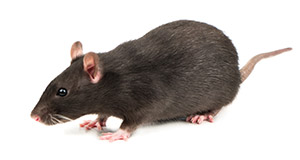
Facts, Identification & Control
Black or brown, 7 to 10″ long, large tail, large ears and eyes, and a pointed nose. Body is smaller and sleeker than Norway rat. Fur is smooth.
Roof rats get their name from their preference of being up high on buildings. They mainly present a rodent control problem in coastal states, particularly in the Southeast. These rats have very poor vision and are colorblind. They only need a crack or opening the size of a quarter to enter a building, and once inside are known for the damage they cause by chewing on materials and eating stored foods. Historically they were known as carriers of the highly dangerous bubonic plague, and continue to transmit serious diseases today.
Omnivorous, but shows a preference for grains, fruits, nuts and vegetables.
To prevent roof rats from entering your home, seal up any holes or cracks larger than a quarter. Remove sources of moisture and harborage, such as indoor trashcans, dripping faucets and open food in pantries. If a rat presence is suspected, our technician can inspect for early warning signs and implement customized rodent control strategies to keep your environment healthy and free of these disease-spreading rodents.

“Take care of the customers you have, and you’ll always have customers to take care of!”.
Your satisfaction is our goal. If you aren’t completely satisfied, we will work with you until you are.
Terry Teague - President of Extermital.